Australian Open, Melbourne
January 13, 1992; 128 Draw (16 seeded); $1,895,685; Surface – Hard
The tournament was deprived of two young American stars: Pete Sampras and Andre Agassi who withdrew due to injuries. Sampras pulled out after the draw had been made (sore shoulder), at the beginning of the year Agassi was supposed to play his first Australian Open ever. The tournament was won by their compatriot and peer, Jim Courier, and this triumph secured him No. 1 spot in the world ranking. It was a breakthrough tournament for two 20-year-old players, Wayne Ferreira and Richard Krajicek, who reached semi-finals and thanks to that achievement they advanced to the Top 20 a few months later to stay there the next couple of years. Both young guys impressed in Melbourne with their trademark shots: Ferreira’s wide-swing forehand, Krajicek’s first booming serve…
All scorelines
First round: Compiled from Wire Reports
Boris Becker dealt out 25 aces to begin defense of his Australian Open tennis title. Becker, returning to the stage where he briefly reached No. 1 in the world last year, gunned down Jan Gunnarsson, 6-1, 6-4, 6-2, today with a display of precise serving, volleying and ground strokes. Becker couldn’t remember the last time he served so many aces, especially over just three sets, but when told the total, he said, “That’s quite a lot, even for me. I couldn’t have asked for a better match.” Top-seeded Stefan Edberg [1] showed only a little rustiness in his first serious match in more than two months because of tendinitis in his knee and a wrist injury. Though bothered by a sore forearm in a tuneup tourney, Edberg easily dispatched Britain’s [169] Jeremy Bates, 6-4, 6-2, 6-4. Patrick McEnroe, the quiet one who shook up the Australian Open by reaching the semifinals a year ago in the absence of his fiery brother, John McEnroe, stirred excitement again. Stuck this time on the same side of the draw as his older brother, Patrick joined two-time champion Ivan Lendl as an easy straight-sets winner. “It’s definitely great to be back here,” the younger Mac said after beating Italy’s Massimo Cierro, 6-3, 6-4, 6-4. “I have fond memories of last year. I love the courts and the surroundings. I know that it’s different than last year, but I’m not coming here saying I have to get to the semis.” The winner in 1989 and 1990 and runner-up to Boris Becker last year, the fifth-seeded Ivan Lendl [4] donned his desert cap again in the 90-degree stadium court heat (30 Celsius) and beat Australian Richard Fromberg, 6-4, 6-2, 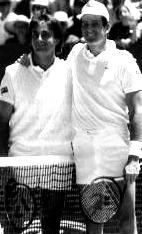 6-2. “I feel like I’m not playing particularly well, but I’m winning matches easily, and that’s confusing to me,” said Lendl, perhaps the hardest working playing on the men’s tour, continues at 30 to be a strong contender for another title.
6-2. “I feel like I’m not playing particularly well, but I’m winning matches easily, and that’s confusing to me,” said Lendl, perhaps the hardest working playing on the men’s tour, continues at 30 to be a strong contender for another title.
Guy Forget [7] and Henri Leconte [161], left-handed Frenchmen who won the Davis Cup two months before, produced a 3-hour-45-minute battle on Centre Court, which Forget won 2-6, 6-4, 6-7(5), 6-4, 6-3, saving a mini-match point at 3:4 in the 4th set with a backhand passing-shot.. It was just 1 out of their 4 meetings on the tour (all matches in majors). John McEnroe returned to the scene of the crime today for a match remarkable mostly – surprise – for his good behavior. Two years ago, the brash New Yorker was kicked out of the Australian Open after throwing a temper tantrum on center court. But the fans welcomed him back with open arms today even though he ousted Broderick Dyke, formerly Australia’s top-ranked player, 6-2, 6-0, 6-1. The two-week Grand Slam event was marred for the second day by the withdrawal of a highly ranked player. Pete Sampras, the men’s No. 6 seed, withdrew Monday with a shoulder injury. A record National Tennis Center crowd of 23,832 still got its money’s worth on a day highlighted by emotional match-ups. No. 2 men’s seed Jim Courier drew a fine for a shouted obscenity as he struggled to a 6-4, 7-6(4), 6-3 victory against France’s Rodolphe Gilbert. Courier, the French Open winner and U.S. Open runner-up, didn’t get much respect from the 84th-ranked Gilbert or officials, who at first assigned the match to a distant outer court, then moved it to the smallest of three show courts. “There were a few things frustrating out there,” Courier said. “I was not hitting the ball as well as I’d like to, and he was hitting it cleanly. He had a few let-cords in a row, and that irritated me, but I got out of it.” Wimbledon winner Michael Stich [5] had his hands full with Spain’s Javier Sanchez. Stich was down a break in the first set and lost the third before struggling into the second round with a 7-5, 6-1, 4-6, 6-3 victory. ”I got the fun back for the game,” he said, though his flat voice was not entirely convincing. “I worked pretty hard, and now I’m enjoying it again. For me, that’s the most important thing, because then I can play good tennis if I really enjoy being out there. Over the last seven days, that’s come back.” Goran Ivanisevic beat Australia’s Jason Stoltenberg, 7-6(12), 6-3, 6-4, saving seven set points in the first set. Stoltenberg’s compatriot, and the future best Australian player of the 90s, 19-year-old Patrick Rafter [292], suffered a 4-set defeat to Jim Grabb [86] in his first major appearance.
Second round: The Associated Press
Stefan Edberg‘s new dictum – “No strain, no pain” – worked just as well for Monica Seles as the Australian Open top seeds survived 110-degree court-side heat (43 Celsius!) and glided closer to their second straight Grand Slam titles. Taking some speed off his serve to save his sore arm, Edberg, the top seed and U.S. Open champion, progressed effortlessly toward his second straight 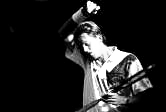 Grand Slam title today with a 6-1, 6-2, 6-1 victory in the second round over Claudio Mezzadri. What Edberg held back in power he made up for with his fluid, quick movement at the net as he showed little rustiness from a two-month layoff caused by knee and wrist injuries. He strained his right forearm in a tuneup exhibition last week and is deliberately pacing himself until the inflammation and pain subside. Mezzadri, a 26-year-old Swiss ranked No. 128, gave Edberg no reason to push himself, obligingly dumping balls into the net, spraying shots wildly, staying deep and yielding the net to Edberg. Swedish fans, their faces painted as always here in the blue and yellow colors of their nation’s flag, also got to cheer an upset by another compatriot, Lars Wahlgren. A qualifier ranked No. 256, Wahlgren beat his second top-20 opponent, 12th-seeded American Derrick Rostagno, 6-1, 7-5, 7-6(3), to reach the third round. “He looked a little bit slow, so today was the right day for me to beat him,” said Wahlgren, who beat No. 20 Brad Gilbert in the first round. “It’s not often you get a chance to beat the very good guys.” Wistful about the past, unsure of the future, John McEnroe assumed the role of benign elder statesman and spoke as if he knew his victory Wednesday might be his last ever at the Australian Open. He could take satisfaction in beating a tough, credible opponent – No. 21 Andrei Cherkasov – 7-5, 3-6, 6-4, 6-3 in a three-hour drama on center court to reach the third round. But McEnroe, his game fashioned around tricky shots and crafty gamesmanship, couldn’t con himself or anyone else about what lay ahead – a match Friday against defending champion Boris Becker. “I have to play my best tennis and get a little bit of luck as well,’‘ McEnroe said. “Maybe I would have a chance then. I am not going out there believing I can’t win the match. If I don’t believe it, I definitely won’t win. I’ll have to make a game plan of some kind, try to be as positive as I can, and hope I can blunt his serve a bit.” Leg propped up on a chair, ice resting on a sore knee that was wrapped in a scarlet brace during the match, McEnroe hardly looked or sounded as if he thought he might be up to the task of beating Becker. The German won their last six matches, between 1986 and 1989, and lost only their first meeting in early 1985, when McEnroe was still No. 1. Boris Becker, who had difficulty beating Italy’s Gianluca Pozzi, 7-5, 7-5, 6-2, flatly declared McEnroe “the greatest player of all time.” “I just have to go out and put his name aside,” Becker said. “He can still hit the ball.” McEnroe had trouble enough with Cherkasov and began the match with another dispute with an umpire – this one over the electric-eye line-calling machine. “When we walked on the court they said we were playing by the machine,” McEnroe said. “”If the beep went off, it was out, and if it didn’t it was in. So I hit a serve in the first game, and the beep didn’t go off, and they called it out. [The umpire] just sort of lied his way out of it.” McEnroe paced around angrily, but returned to serve before getting himself in trouble. The dispute, which never approached the feverish pitch of the tantrum that got him thrown out two years ago, nevertheless contributed to his service break in that game on the fifth break point against him. McEnroe’s good friend, Australian wild card and 1987 Wimbledon champion Pat Cash, fell short in his bid for an upset as he lost a thrilling five-setter Wednesday
Grand Slam title today with a 6-1, 6-2, 6-1 victory in the second round over Claudio Mezzadri. What Edberg held back in power he made up for with his fluid, quick movement at the net as he showed little rustiness from a two-month layoff caused by knee and wrist injuries. He strained his right forearm in a tuneup exhibition last week and is deliberately pacing himself until the inflammation and pain subside. Mezzadri, a 26-year-old Swiss ranked No. 128, gave Edberg no reason to push himself, obligingly dumping balls into the net, spraying shots wildly, staying deep and yielding the net to Edberg. Swedish fans, their faces painted as always here in the blue and yellow colors of their nation’s flag, also got to cheer an upset by another compatriot, Lars Wahlgren. A qualifier ranked No. 256, Wahlgren beat his second top-20 opponent, 12th-seeded American Derrick Rostagno, 6-1, 7-5, 7-6(3), to reach the third round. “He looked a little bit slow, so today was the right day for me to beat him,” said Wahlgren, who beat No. 20 Brad Gilbert in the first round. “It’s not often you get a chance to beat the very good guys.” Wistful about the past, unsure of the future, John McEnroe assumed the role of benign elder statesman and spoke as if he knew his victory Wednesday might be his last ever at the Australian Open. He could take satisfaction in beating a tough, credible opponent – No. 21 Andrei Cherkasov – 7-5, 3-6, 6-4, 6-3 in a three-hour drama on center court to reach the third round. But McEnroe, his game fashioned around tricky shots and crafty gamesmanship, couldn’t con himself or anyone else about what lay ahead – a match Friday against defending champion Boris Becker. “I have to play my best tennis and get a little bit of luck as well,’‘ McEnroe said. “Maybe I would have a chance then. I am not going out there believing I can’t win the match. If I don’t believe it, I definitely won’t win. I’ll have to make a game plan of some kind, try to be as positive as I can, and hope I can blunt his serve a bit.” Leg propped up on a chair, ice resting on a sore knee that was wrapped in a scarlet brace during the match, McEnroe hardly looked or sounded as if he thought he might be up to the task of beating Becker. The German won their last six matches, between 1986 and 1989, and lost only their first meeting in early 1985, when McEnroe was still No. 1. Boris Becker, who had difficulty beating Italy’s Gianluca Pozzi, 7-5, 7-5, 6-2, flatly declared McEnroe “the greatest player of all time.” “I just have to go out and put his name aside,” Becker said. “He can still hit the ball.” McEnroe had trouble enough with Cherkasov and began the match with another dispute with an umpire – this one over the electric-eye line-calling machine. “When we walked on the court they said we were playing by the machine,” McEnroe said. “”If the beep went off, it was out, and if it didn’t it was in. So I hit a serve in the first game, and the beep didn’t go off, and they called it out. [The umpire] just sort of lied his way out of it.” McEnroe paced around angrily, but returned to serve before getting himself in trouble. The dispute, which never approached the feverish pitch of the tantrum that got him thrown out two years ago, nevertheless contributed to his service break in that game on the fifth break point against him. McEnroe’s good friend, Australian wild card and 1987 Wimbledon champion Pat Cash, fell short in his bid for an upset as he lost a thrilling five-setter Wednesday  night to Emilio Sanchez, 7-6(5), 6-2, 6-7(9), 3-6, 6-1 in 3 hours 55 minutes. It wasn’t such a good day for Australia’s Cash, who was fined a tournament record $9,000 for a verbal obscenity against a lines-woman in his five-set loss the night before to 13th-seeded Sanchez. The assessment meant that after collecting his prize money for a first-round victory, Cash lost $2,185 for competing. Aaron Krickstein led an assault on seeded players in today’s morning play, beating No. 10 Goran Ivanisevic 6-2, 7-5, 6-1, in what the Croation called “the worst match I’ve ever played in my life.” Ivanisevic had 49 unforced errors to 13 by Krickstein. “I like to think I had a little bit of something to do with this,” Krickstein said. “The way I play him, keeping him back, works really well. The way we match up, I think I can beat him every time. He’s had a reputation for packing it in. I knew if I could get a lead, I’d be in good shape.” Jim Courier said Thursday: “The beauty of it is that people recognize me more with my hat on, so when I go on the street and take my hat off, I’m kind of incognito,” after reaching the third round with a 2-6, 6-3, 6-1, 6-4 victory over young Swedish hotshot Thomas Enqvist [190]. Courier stared in disbelief at a backhand by Enqvist that kissed the line near the corner to finish off the sixth game of the first set and gave him a 5:1 lead. In the second set, though, Courier ‘s own serves seemed crisper and more accurate as he opened with a service winner and produced an ace to take the first game. That was the signal to Enqvist that, although he might model his style after Courier, he is not quite at the same level yet. Enqvist’s undoing, ultimately, appeared more mental than physical, as he double-faulted at deuce, with Courier leading 5:4 in the fourth set, then netted an easy backhand volley on match-point. 18-year-old Enqvist, the best junior at the time, was announced in ’92 as a possible successor of Borg and Wilander.
night to Emilio Sanchez, 7-6(5), 6-2, 6-7(9), 3-6, 6-1 in 3 hours 55 minutes. It wasn’t such a good day for Australia’s Cash, who was fined a tournament record $9,000 for a verbal obscenity against a lines-woman in his five-set loss the night before to 13th-seeded Sanchez. The assessment meant that after collecting his prize money for a first-round victory, Cash lost $2,185 for competing. Aaron Krickstein led an assault on seeded players in today’s morning play, beating No. 10 Goran Ivanisevic 6-2, 7-5, 6-1, in what the Croation called “the worst match I’ve ever played in my life.” Ivanisevic had 49 unforced errors to 13 by Krickstein. “I like to think I had a little bit of something to do with this,” Krickstein said. “The way I play him, keeping him back, works really well. The way we match up, I think I can beat him every time. He’s had a reputation for packing it in. I knew if I could get a lead, I’d be in good shape.” Jim Courier said Thursday: “The beauty of it is that people recognize me more with my hat on, so when I go on the street and take my hat off, I’m kind of incognito,” after reaching the third round with a 2-6, 6-3, 6-1, 6-4 victory over young Swedish hotshot Thomas Enqvist [190]. Courier stared in disbelief at a backhand by Enqvist that kissed the line near the corner to finish off the sixth game of the first set and gave him a 5:1 lead. In the second set, though, Courier ‘s own serves seemed crisper and more accurate as he opened with a service winner and produced an ace to take the first game. That was the signal to Enqvist that, although he might model his style after Courier, he is not quite at the same level yet. Enqvist’s undoing, ultimately, appeared more mental than physical, as he double-faulted at deuce, with Courier leading 5:4 in the fourth set, then netted an easy backhand volley on match-point. 18-year-old Enqvist, the best junior at the time, was announced in ’92 as a possible successor of Borg and Wilander.
Third round: The Associated Press
 John McEnroe turned back the clock today with a virtuoso performance that ousted defending champion Boris Becker from the Australian Open, with McEnroe winning 6-4, 6-3, 7-5. Becker succumbed in the 11th game of the final set after five break points. When Becker, who fended off three break points in his previous service game, hit a backhand long for the break, McEnroe pumped both fists, and the crowd roared, sensing the upset in the making. McEnroe served successive aces, his fifth and sixth of the match, to go to match point at 40/30, then watched Becker’s last shot, a backhand, float long for the final point. McEnroe raised both arms to the crowd and flashed the most satisfied smile he had shown in a long time, then whacked a ball high into the stands after shaking Becker’s hand at the net. McEnroe again pumped his arms in the air as the crowd’s cheers intensified. Becker, who had eight aces but none in the first set, never could raise his game to the level he has shown in the past. Rather, he stomped around the court, angrily berating himself as he did when he lost the Wimbledon final to Michael Stich last year. “Nothing goes!” Becker screamed in German at one point. “Trash, Trash!” he yelled on another occasion. McEnroe played so fluidly that in one stretch, he lost only four points in four service games from the end of the first set to the middle of the second. Rather than relying only on touch volleys and finesse, McEnroe matched Becker’s power with plenty of his own as he put away approach shots and backpedaling overheads. The two players exchanged service breaks early in all three sets, but it was McEnroe who came up with the key points. After McEnroe held serve at 5:4 in the first set, Becker moved ahead 15/0 before McEnroe ripped off five straight points, pouncing on two second serves to break for the set. On serve at 4:3 in the second set, McEnroe again bore down. On the third deuce, he made back-to-back great returns off Becker’s first serve. The German netted the first, then mis-hit the second. “This is a big monkey off my back,” McEnroe said. “It’s been so long since I had such a big win. I can’t even remember.” The unseeded McEnroe, a heavy underdog, electrified a capacity crowd on the 15,000-seat center court stadium with a brilliant exhibition of aggressive tennis that kept the third-seeded Becker defensive and off-balance. Patrick McEnroe‘s magic at the Australian Open ran out in a draining five-setter against Andrei Chesnokov after 92 errors capped by a double-fault into the net on match point. McEnroe, a semifinalist last year, fell 6-4, 1-6, 1-6, 6-1, 6-3 in a third- round match Friday about six hours before his brother John was scheduled to play against defending champion Boris Becker. Chesnokov broke the younger McEnroe in his last three service games, the final time with the help of an unforced error wide by McEnroe on an easy backhand at deuce. That was followed by two weak serves on match point. It was an error-filled baseline duel from the start, with Chesnokov making just fewer mistakes to take the first set. But the Russian recovered from a long lapse in the second and third sets to wear down McEnroe. David Wheaton, happy with his $2 million prize at the Grand Slam Cup but hoping to win an actual Grand Slam title this year, reached the fourth round with a 6-4, 6-3, 6-3 victory over Lars Koslowski. Wheaton pounded out five of his 10 aces in the final set. Jim Courier doesn’t stroke the ball so much as he rears back and tries to knock the fuzz off it. Australian Open fans watch him with a sense of awe, gasping at the power of his shots. He was ranked No. 25 and little-known a year ago, a fourth-round loser who rarely gathered a crowd. This time he’s No. 2 and everyone wants to watch him. “I’m not afraid to win, and I’m not afraid to lose,” said Courier, who hit nearly every shot full tilt in reaching the fourth round with a 6-1, 6-4, 6-2 victory over Thomas Muster on Saturday. Courier, winner of the French Open and runner-up at the U.S. Open, has an unseeded path to the semifinals, where he could face sore-armed Wimbledon champion Michael Stich. Michael Chang [16], a master of the five-set match, got a lesson in comeback skills from a rangy Dutchman with a blistering serve. Chang, who had an 11-2 record in five-set matches, lost in a three-hour battle to [45] Richard Krajicek, 6-4, 6-1, 5-7, 1-6, 6-3. Chang lost the first two sets to Krajicek, who was serving for the match at 5:4 in the third. But Krajicek’s game suddenly fell apart on a pair of double faults as Chang broke to start a string of eight straight games. When Chang held to take the fourth set in only 23 minutes, Krajicek looked dejected, his 125 mph serve faltering and his ground-strokes erratic. “I thought he was getting a little tired,” Chang said. “The fourth set, he wasn’t there.” Krajicek countered: “He just played good. Every time I served and volleyed, he’d hit a good return or passing shot. I was really trying but he
John McEnroe turned back the clock today with a virtuoso performance that ousted defending champion Boris Becker from the Australian Open, with McEnroe winning 6-4, 6-3, 7-5. Becker succumbed in the 11th game of the final set after five break points. When Becker, who fended off three break points in his previous service game, hit a backhand long for the break, McEnroe pumped both fists, and the crowd roared, sensing the upset in the making. McEnroe served successive aces, his fifth and sixth of the match, to go to match point at 40/30, then watched Becker’s last shot, a backhand, float long for the final point. McEnroe raised both arms to the crowd and flashed the most satisfied smile he had shown in a long time, then whacked a ball high into the stands after shaking Becker’s hand at the net. McEnroe again pumped his arms in the air as the crowd’s cheers intensified. Becker, who had eight aces but none in the first set, never could raise his game to the level he has shown in the past. Rather, he stomped around the court, angrily berating himself as he did when he lost the Wimbledon final to Michael Stich last year. “Nothing goes!” Becker screamed in German at one point. “Trash, Trash!” he yelled on another occasion. McEnroe played so fluidly that in one stretch, he lost only four points in four service games from the end of the first set to the middle of the second. Rather than relying only on touch volleys and finesse, McEnroe matched Becker’s power with plenty of his own as he put away approach shots and backpedaling overheads. The two players exchanged service breaks early in all three sets, but it was McEnroe who came up with the key points. After McEnroe held serve at 5:4 in the first set, Becker moved ahead 15/0 before McEnroe ripped off five straight points, pouncing on two second serves to break for the set. On serve at 4:3 in the second set, McEnroe again bore down. On the third deuce, he made back-to-back great returns off Becker’s first serve. The German netted the first, then mis-hit the second. “This is a big monkey off my back,” McEnroe said. “It’s been so long since I had such a big win. I can’t even remember.” The unseeded McEnroe, a heavy underdog, electrified a capacity crowd on the 15,000-seat center court stadium with a brilliant exhibition of aggressive tennis that kept the third-seeded Becker defensive and off-balance. Patrick McEnroe‘s magic at the Australian Open ran out in a draining five-setter against Andrei Chesnokov after 92 errors capped by a double-fault into the net on match point. McEnroe, a semifinalist last year, fell 6-4, 1-6, 1-6, 6-1, 6-3 in a third- round match Friday about six hours before his brother John was scheduled to play against defending champion Boris Becker. Chesnokov broke the younger McEnroe in his last three service games, the final time with the help of an unforced error wide by McEnroe on an easy backhand at deuce. That was followed by two weak serves on match point. It was an error-filled baseline duel from the start, with Chesnokov making just fewer mistakes to take the first set. But the Russian recovered from a long lapse in the second and third sets to wear down McEnroe. David Wheaton, happy with his $2 million prize at the Grand Slam Cup but hoping to win an actual Grand Slam title this year, reached the fourth round with a 6-4, 6-3, 6-3 victory over Lars Koslowski. Wheaton pounded out five of his 10 aces in the final set. Jim Courier doesn’t stroke the ball so much as he rears back and tries to knock the fuzz off it. Australian Open fans watch him with a sense of awe, gasping at the power of his shots. He was ranked No. 25 and little-known a year ago, a fourth-round loser who rarely gathered a crowd. This time he’s No. 2 and everyone wants to watch him. “I’m not afraid to win, and I’m not afraid to lose,” said Courier, who hit nearly every shot full tilt in reaching the fourth round with a 6-1, 6-4, 6-2 victory over Thomas Muster on Saturday. Courier, winner of the French Open and runner-up at the U.S. Open, has an unseeded path to the semifinals, where he could face sore-armed Wimbledon champion Michael Stich. Michael Chang [16], a master of the five-set match, got a lesson in comeback skills from a rangy Dutchman with a blistering serve. Chang, who had an 11-2 record in five-set matches, lost in a three-hour battle to [45] Richard Krajicek, 6-4, 6-1, 5-7, 1-6, 6-3. Chang lost the first two sets to Krajicek, who was serving for the match at 5:4 in the third. But Krajicek’s game suddenly fell apart on a pair of double faults as Chang broke to start a string of eight straight games. When Chang held to take the fourth set in only 23 minutes, Krajicek looked dejected, his 125 mph serve faltering and his ground-strokes erratic. “I thought he was getting a little tired,” Chang said. “The fourth set, he wasn’t there.” Krajicek countered: “He just played good. Every time I served and volleyed, he’d hit a good return or passing shot. I was really trying but he 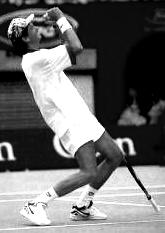 played better.” After breaking Chang to move ahead 5:3, Krajicek finished him off with three aces sandwiched around an overhead. “When his serve is working,” said Chang, “he’s dangerous for anyone.” “I got the rhythm back in my serve in the fifth set and I was very confident,” Krajicek said. “I had a whole different attitude serving for the match in the third set than I did in the fifth set.” Krajicek said his height was the result of a late growth spurt. “Until I was 16, I was very small, so my serve was the least important part of my game. I had good technique but I just put it in play.” In his previous major, Krajicek choked badly leading 2-0 in sets against Ivan Lendl at the US Open 1991. A grumpy Michael Stich, still struggling to find the form that carried him to the Wimbledon title, survived another subpar outing in downing Martin Jaite 6-0, 2-6, 7-5, 6-2 and also advancing to the round of 16. MaliVai Washington, who beat No. 16 Goran Prpic in the second round, lost to Australia’s Wally Masur 6-3, 6-3, 6-4. Perhaps the 14th-seeded Chang should have stopped and watched Aaron Krickstein before taking center court against Krajicek. Krickstein, another long-match specialist, ran his five-set record to 22-6, ousting Alexander Volkov 6-4, 5-7, 6-7(2), 6-1, 8-6 in four hours. Omar Camporse beat Lars-Anders Wahlgren 6-4, 6-2, 7-6(15) – the longest tie-break at the Australian Open at the time, the record has been beaten since 2007 (Tsonga vs. Roddick).
played better.” After breaking Chang to move ahead 5:3, Krajicek finished him off with three aces sandwiched around an overhead. “When his serve is working,” said Chang, “he’s dangerous for anyone.” “I got the rhythm back in my serve in the fifth set and I was very confident,” Krajicek said. “I had a whole different attitude serving for the match in the third set than I did in the fifth set.” Krajicek said his height was the result of a late growth spurt. “Until I was 16, I was very small, so my serve was the least important part of my game. I had good technique but I just put it in play.” In his previous major, Krajicek choked badly leading 2-0 in sets against Ivan Lendl at the US Open 1991. A grumpy Michael Stich, still struggling to find the form that carried him to the Wimbledon title, survived another subpar outing in downing Martin Jaite 6-0, 2-6, 7-5, 6-2 and also advancing to the round of 16. MaliVai Washington, who beat No. 16 Goran Prpic in the second round, lost to Australia’s Wally Masur 6-3, 6-3, 6-4. Perhaps the 14th-seeded Chang should have stopped and watched Aaron Krickstein before taking center court against Krajicek. Krickstein, another long-match specialist, ran his five-set record to 22-6, ousting Alexander Volkov 6-4, 5-7, 6-7(2), 6-1, 8-6 in four hours. Omar Camporse beat Lars-Anders Wahlgren 6-4, 6-2, 7-6(15) – the longest tie-break at the Australian Open at the time, the record has been beaten since 2007 (Tsonga vs. Roddick).
Fourth round: The Associated Press
One of the most amazing topsy-turvy 5-setters in the Garnd Slam history: John McEnroe, obeying his self-imposed gag order on court, stayed cool in blistering 124-degree heat (51 Celsius!!) and pulled off a five-set, 4-hour, 41-minute “McMiracle” at the Australian Open on Sunday. McEnroe, three games from a straight-sets victory and spot in the quarterfinals, endured a comeback by the younger Emilio Sanchez, the 13th seed, and won 7-5, 7-6(4), 4-6, 2-6, 8-6 on his sixth match point. Unlike McEnroe’s three-set victory over defending champion Boris Becker, a match played on a chilly night against a powerful serve-and-volleyer, McEnroe had to cope this time with a burning court and a baseliner. He had to stave off three match points himself in the fifth set. Fellow American [30] Aaron Krickstein yielded to heat exhaustion and nausea early today, quitting at 6-2, 4-6, 1-6, 7-6(4), 4-1 against Israeli Amos Mansdorf [65]. On the changeover after the fifth game of the fifth set, Krickstein slumped into his chair and told the umpire he couldn’t go on. Krickstein had one of the best records in five-setters, 22-6, before the match, and had beaten Mansdorf in the four of their five meetings. Mansdorf advanced to the  last 8 in a major for the first time on the fourth attempt in the fourth round. On Sunday, McEnroe ruled the net with his quickness, touch volleys and overheads in the first two sets, forcing Sanchez to change his tactics and venture away from the baseline. “He was fighting a lot, keeping the pressure on me all the time,” Sanchez said. “I had to be more aggressive.” As Sanchez attacked more in the third set, McEnroe began to wilt, appearing to show the six-year age difference with the 26-year-old Spaniard. “He picked up the pace and served and volleyed effectively,” McEnroe said. “I knew, in one sense, he was getting desperate and was doing something he wasn’t comfortable with, but it went in his favor. But I also knew in the final set, he couldn’t make up his mind whether to come in or stay back.” Sanchez, trailing 3:2 in the third set, held, then broke McEnroe to 4:3 as McEnroe wearily hit an indifferent backhand wide. The fourth set turned into a rest stop for McEnroe, who seemed to drift through it while awaiting his chance in the fifth set. At the moment of truth in the fifth set, McEnroe reached deep inside and found the strength to win. The fifth set boiled down to missed opportunities. McEnroe squandered a triple match point when he was leading 5:4, and Sanchez blew three match points on serve while leading 6:5 (including 40/15, Sanchez served his only double fault in the entire match!). McEnroe held serve at 7:6 with a delicate and gutsy forehand drop volley at 40-15, then jumped on Sanchez’s serve for a 0/30 lead with a backhand volley on the second point. Sanchez netted an easy backhand, giving McEnroe two more match points, but the first was wasted with a backhand into the net on a passing attempt. Sanchez saved his fifth match point with a forehand pass cross-court. McEnroe finally ended the incredible duel on his sixth match point with a forehand into the corner. McEnroe wrapped his arms around Sanchez in an affectionate hug. “This is just unbelievable,” McEnroe said of what he remembered thinking as he approached Sanchez after the match. “It’s one of those things where a handshake is not sufficient. ” Jim Courier, the No. 2 seed, played in the same heat on a court buffeted by strong, warm breezes early today, and escaped with a much easier victory, 6-3, 6-1, 6-3, over unseeded Marc Rosset to reach the quarters. Courier watched the McEnroe match in awe of their struggle, but didn’t envy missing the drama of a long five-setter. “My legs are very happy to sneak through in straight sets,” Courier said, adding that he’d love to play McEnroe in this tournament. “Absolutely. That’d mean I’m in the final.”
last 8 in a major for the first time on the fourth attempt in the fourth round. On Sunday, McEnroe ruled the net with his quickness, touch volleys and overheads in the first two sets, forcing Sanchez to change his tactics and venture away from the baseline. “He was fighting a lot, keeping the pressure on me all the time,” Sanchez said. “I had to be more aggressive.” As Sanchez attacked more in the third set, McEnroe began to wilt, appearing to show the six-year age difference with the 26-year-old Spaniard. “He picked up the pace and served and volleyed effectively,” McEnroe said. “I knew, in one sense, he was getting desperate and was doing something he wasn’t comfortable with, but it went in his favor. But I also knew in the final set, he couldn’t make up his mind whether to come in or stay back.” Sanchez, trailing 3:2 in the third set, held, then broke McEnroe to 4:3 as McEnroe wearily hit an indifferent backhand wide. The fourth set turned into a rest stop for McEnroe, who seemed to drift through it while awaiting his chance in the fifth set. At the moment of truth in the fifth set, McEnroe reached deep inside and found the strength to win. The fifth set boiled down to missed opportunities. McEnroe squandered a triple match point when he was leading 5:4, and Sanchez blew three match points on serve while leading 6:5 (including 40/15, Sanchez served his only double fault in the entire match!). McEnroe held serve at 7:6 with a delicate and gutsy forehand drop volley at 40-15, then jumped on Sanchez’s serve for a 0/30 lead with a backhand volley on the second point. Sanchez netted an easy backhand, giving McEnroe two more match points, but the first was wasted with a backhand into the net on a passing attempt. Sanchez saved his fifth match point with a forehand pass cross-court. McEnroe finally ended the incredible duel on his sixth match point with a forehand into the corner. McEnroe wrapped his arms around Sanchez in an affectionate hug. “This is just unbelievable,” McEnroe said of what he remembered thinking as he approached Sanchez after the match. “It’s one of those things where a handshake is not sufficient. ” Jim Courier, the No. 2 seed, played in the same heat on a court buffeted by strong, warm breezes early today, and escaped with a much easier victory, 6-3, 6-1, 6-3, over unseeded Marc Rosset to reach the quarters. Courier watched the McEnroe match in awe of their struggle, but didn’t envy missing the drama of a long five-setter. “My legs are very happy to sneak through in straight sets,” Courier said, adding that he’d love to play McEnroe in this tournament. “Absolutely. That’d mean I’m in the final.”
Quarterfinals: Steve Wilstein
No. 1 Stefan Edberg won another epic five-setter against longtime nemesis Ivan Lendl to reach the Australian Open semifinals today, while No. Jim Courier quietly joined him with a third consecutive three-set victory. Edberg evened his five-set record against Lendl at two apiece with a 4-6, 7-5, 6-1, 6-7(5), 6-1 victory in their 25th career duel. On a strength-sapping, hot and muggy afternoon, Edberg showed he had recovered fully from his two-month injury-induced layoff. He raised the level of his game as the match wore on and seemed surprised to see the normally indefatigable Lendl wilt in the third and fifth sets of the 3-hour, 10-minute match. “I didn’t really have too much chance in the beginning,” said Edberg, who found his opportunity at last with Lendl serving at 5:4 in the 2nd set. Lendl made three unforced errors, all on forehands, the last one drifting long for a break. In terms of scoreline they had almost identical match over four sets in the 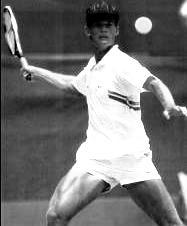 Aussie Open semifinal a year before, when Lendl won 6-4, 5-7, 3-6, 7-6, 6-4. John McEnroe‘s magical run at the Australian Open came to an end today at the hands of a 20-year-old who has never won a professional tournament. Wayne Ferreira [46], a South African, gave McEnroe a thorough beating with a booming serve and stinging ground-strokes. His 6-4, 6-4, 6-4 victory earned him a semifinal meeting Friday with top-seeded Stefan Edberg. McEnroe, owner of one of the best service returns in tennis, had to watch as Ferreira blasted 15 aces and numerous winners. His go-for-broke style meant that when he missed, he missed badly. But he didn’t miss often in the two-hour whipping. “I came out very strong,” Ferreira said. “I felt right from the start of the match that I could win that quick.” McEnroe, broken once in each set, could manage only three break points. Ferreira had at least one ace in each of his first 10 service games. He finished off the first set with ace No. 6 and the second set with No. 13. The left-hander from New York watched Ferreira’s almost flawless display in disbelief, often standing with hands on hips after watching winners zing by for two hours. “He just played too good,” McEnroe said. “He outplayed me. I had heard through friends that Ferreira was a big talent.” Jim Courier had no trouble disposing of Amos Mansdorf, 6-3, 6-2, 6-2, to go into his third Grand Slam semifinal. Courier won the French Open last year and was runner-up to Edberg in the U.S. Open. “Any time you can get into the deep end of the second week of the Grand Slams, it’s fantastic,” Courier said. “I’m playing well.” Richard Krajicek, that tall stranger from the Netherlands, pulled out his racket Wednesday and fired winner after winner at Wimbledon champion Michael Stich, winding up in the semifinals of the Australian Open. With a 5-7, 7-6(2), 6-7(1), 6-4, 6-4 victory, he was one of two virtually unknown players advancing to the round of four. Krajicek had 23 aces, Stich 14 in the match. Between them, they had 108 serves that failed to make it back into play. Baseline rallies? Not with these two around. Stich, who rose rapidly through the ranks last year to gain his current No. 5 ranking, is well-known for his serve. But Krajicek, at 20 the youngest player left in the men’s draw (three months younger than Ferreira), quickly has earned a reputation for his, too. “I thought I was playing against me out there,” Stich said. Krajicek’s serve, clocked as high as 129 mph, is his biggest weapon and has taken him to the No. 40 ranking since he turned pro in 1989. Stich only broke him once in 28 service games. But the 20-year-old Krajicek’s accumulation of aces slowed as the match went on. Several times he rubbed the shoulder, and his first-serve accuracy and speed dropped markedly. Stich commented after the match that he thought Krajicek tired in the heat and humidity, and his serves lost some of their sting. Krajicek became my favorite player after that match and it maintained until the end of his career 11 years later.
Aussie Open semifinal a year before, when Lendl won 6-4, 5-7, 3-6, 7-6, 6-4. John McEnroe‘s magical run at the Australian Open came to an end today at the hands of a 20-year-old who has never won a professional tournament. Wayne Ferreira [46], a South African, gave McEnroe a thorough beating with a booming serve and stinging ground-strokes. His 6-4, 6-4, 6-4 victory earned him a semifinal meeting Friday with top-seeded Stefan Edberg. McEnroe, owner of one of the best service returns in tennis, had to watch as Ferreira blasted 15 aces and numerous winners. His go-for-broke style meant that when he missed, he missed badly. But he didn’t miss often in the two-hour whipping. “I came out very strong,” Ferreira said. “I felt right from the start of the match that I could win that quick.” McEnroe, broken once in each set, could manage only three break points. Ferreira had at least one ace in each of his first 10 service games. He finished off the first set with ace No. 6 and the second set with No. 13. The left-hander from New York watched Ferreira’s almost flawless display in disbelief, often standing with hands on hips after watching winners zing by for two hours. “He just played too good,” McEnroe said. “He outplayed me. I had heard through friends that Ferreira was a big talent.” Jim Courier had no trouble disposing of Amos Mansdorf, 6-3, 6-2, 6-2, to go into his third Grand Slam semifinal. Courier won the French Open last year and was runner-up to Edberg in the U.S. Open. “Any time you can get into the deep end of the second week of the Grand Slams, it’s fantastic,” Courier said. “I’m playing well.” Richard Krajicek, that tall stranger from the Netherlands, pulled out his racket Wednesday and fired winner after winner at Wimbledon champion Michael Stich, winding up in the semifinals of the Australian Open. With a 5-7, 7-6(2), 6-7(1), 6-4, 6-4 victory, he was one of two virtually unknown players advancing to the round of four. Krajicek had 23 aces, Stich 14 in the match. Between them, they had 108 serves that failed to make it back into play. Baseline rallies? Not with these two around. Stich, who rose rapidly through the ranks last year to gain his current No. 5 ranking, is well-known for his serve. But Krajicek, at 20 the youngest player left in the men’s draw (three months younger than Ferreira), quickly has earned a reputation for his, too. “I thought I was playing against me out there,” Stich said. Krajicek’s serve, clocked as high as 129 mph, is his biggest weapon and has taken him to the No. 40 ranking since he turned pro in 1989. Stich only broke him once in 28 service games. But the 20-year-old Krajicek’s accumulation of aces slowed as the match went on. Several times he rubbed the shoulder, and his first-serve accuracy and speed dropped markedly. Stich commented after the match that he thought Krajicek tired in the heat and humidity, and his serves lost some of their sting. Krajicek became my favorite player after that match and it maintained until the end of his career 11 years later.
Semifinals: (AP)
The No. 1 Stefan Edberg, who played impeccably to crush Courier in the U.S. Open final last summer, looked only slightly less perfect in stopping upstart Wayne Ferreira 7-6(2), 6-1, 6-2. Ferreira, the conqueror of John McEnroe, held two set-points on Edberg’s service at 6:5 in the first set, but blew them both with forehand errors as his confidence and game drifted away. Ferreira, who aced McEnroe 15 times, double-faulted nine times in six games starting at the beginning of the second set. At 4:1 in that set, he double-faulted twice to give Edberg a 5:1 lead. Ferreira managed only one ace in the last two sets after  hitting four in the first set. He also committed 58 unforced errors to Edberg’s 21. “I think once I got the first set, I got on top of him and his game fell apart,” Edberg said. “He started making errors and I took advantage of that. I’m playing good tennis.” Looking ahead to the final against No. 2 Courier, Edberg said, “It’s going to be good – No. 1 against No. 2. I like that.” Richard Krajicek‘s booming serve carried him to the semifinals of the Australian Open. Now it could force him out of the tournament. The lanky 6-foot-4 Dutchman blasted 22 aces in beating Wimbledon champion Michael Stich on Wednesday. But the five-set match and the two weeks of daily strain have taken their toll – Krajicek was forced to withdraw from a semifinals doubles match today because of tendinitis in his shoulder. He was examined by a doctor, but there was no immediate decision on his status for Friday’s match against second-seeded Jim Courier. Despite his size, the unseeded Krajicek looks a little fragile at 175 pounds (79 kg), and has been working out in a gym to add bulk to his frame (he added 10 kg to his posture later on). Krajicek and fellow Dutchman Jan Siemerink were leading their doubles match today 6-4, 1-3 against Australians Mark Woodforde and Todd Woodbridge when he called it quits for the day. Krajicek withdrew from his semifinal match against Courier. “To make the semifinals in singles and doubles, and to have to default, is unbelievable. It’s almost tragic,” Courier said. “The upside is I’m in the final. The downside is I don’t get to play. You like to be in a rhythm going into the final of tournament.”
hitting four in the first set. He also committed 58 unforced errors to Edberg’s 21. “I think once I got the first set, I got on top of him and his game fell apart,” Edberg said. “He started making errors and I took advantage of that. I’m playing good tennis.” Looking ahead to the final against No. 2 Courier, Edberg said, “It’s going to be good – No. 1 against No. 2. I like that.” Richard Krajicek‘s booming serve carried him to the semifinals of the Australian Open. Now it could force him out of the tournament. The lanky 6-foot-4 Dutchman blasted 22 aces in beating Wimbledon champion Michael Stich on Wednesday. But the five-set match and the two weeks of daily strain have taken their toll – Krajicek was forced to withdraw from a semifinals doubles match today because of tendinitis in his shoulder. He was examined by a doctor, but there was no immediate decision on his status for Friday’s match against second-seeded Jim Courier. Despite his size, the unseeded Krajicek looks a little fragile at 175 pounds (79 kg), and has been working out in a gym to add bulk to his frame (he added 10 kg to his posture later on). Krajicek and fellow Dutchman Jan Siemerink were leading their doubles match today 6-4, 1-3 against Australians Mark Woodforde and Todd Woodbridge when he called it quits for the day. Krajicek withdrew from his semifinal match against Courier. “To make the semifinals in singles and doubles, and to have to default, is unbelievable. It’s almost tragic,” Courier said. “The upside is I’m in the final. The downside is I don’t get to play. You like to be in a rhythm going into the final of tournament.”
Final: Steve Wilstein
Jim Courier, ascending within a notch of the No. 1 ranking, beat Stefan Edberg to become the first American winner of the Australian Open in 10 years and capture a second Grand Slam title. Courier, dominated thoroughly by Edberg in the 1991 U.S. Open after beating him en route to the French Open crown, drove a final backhand return past Edberg to win early today, 6-3, 3-6, 6-4, 6-2. “This tastes just as sweet,” said Courier, 21, comparing his Australian title with the French. “It’s a little bit different because I’ve done it before. But it’s no less significant.” The victory marked another milestone in Courier ‘s amazing rise from No. 25 a year ago. He ended 1991 with the No. 2 ranking, and can take No. 1 away from Edberg 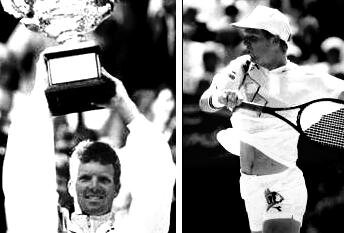 within the next few months (he did it already two weeks later advancing to the San Francisco final, Edberg took a week off at the same time). No American has been No. 1 since John McEnroe in 1985. Edberg, who missed the last two months of 1991 with wrist and knee injuries, played far below his near-perfect form in the U.S. Open. “I didn’t have the timing today,” Edberg said. “I didn’t play the big points as well. It wasn’t my day today. He played a good, solid match, and took advantage of the opportunities I gave him.” The absence from tennis, he said, “was bound to catch up with me sooner or later.” Courier, of Dade City, Fla., who reached the final without meeting a seeded player, pounded two-fisted backhands and short, punchy forehands with enough force to keep Edberg, a two-time Australian champion, either pinned on the baseline or off-balance at the net. Courier’s backhand was his most important stroke, accounting for 28 winners. Edberg’s backhand, meanwhile, lacked authority and accuracy, perhaps weakened by the forearm strain he suffered before the tournament. Edberg seemed oddly edgy most of the match, complaining about the “softness” of the balls and a couple of line calls. Despite the loud support of Swedish fans with faces painted the blue and yellow colors of their flag, Edberg couldn’t summon the strength he showed in New York. Courier broke Edberg for the first time to 4:2 in the first set when Edberg double-faulted for the first of seven times in the match, then hit a weak volley into the net on a strong backhand return at break point. Courier fought off a break point at 5:3, 30/40 when Edberg netted three straight backhands. Edberg evened the match in the second set, breaking Courier to 2:0 with a beautiful lob that landed on the baseline for the last point. Edberg had a game point to level at 5 games apiece in the 3rd set, but at deuce committed two straight double faults! In the 4th set it was all about Courier since he served an ace trailing 0/30 at 2 all. The American won 17 out of 21 points since then finishing the match with a backhand return winner… It was Courier’s fifth title, the first one since Roland Garros 1991. None player had won as little titles as Courier thus far, having two different major triumphs. Stats of the final.
within the next few months (he did it already two weeks later advancing to the San Francisco final, Edberg took a week off at the same time). No American has been No. 1 since John McEnroe in 1985. Edberg, who missed the last two months of 1991 with wrist and knee injuries, played far below his near-perfect form in the U.S. Open. “I didn’t have the timing today,” Edberg said. “I didn’t play the big points as well. It wasn’t my day today. He played a good, solid match, and took advantage of the opportunities I gave him.” The absence from tennis, he said, “was bound to catch up with me sooner or later.” Courier, of Dade City, Fla., who reached the final without meeting a seeded player, pounded two-fisted backhands and short, punchy forehands with enough force to keep Edberg, a two-time Australian champion, either pinned on the baseline or off-balance at the net. Courier’s backhand was his most important stroke, accounting for 28 winners. Edberg’s backhand, meanwhile, lacked authority and accuracy, perhaps weakened by the forearm strain he suffered before the tournament. Edberg seemed oddly edgy most of the match, complaining about the “softness” of the balls and a couple of line calls. Despite the loud support of Swedish fans with faces painted the blue and yellow colors of their flag, Edberg couldn’t summon the strength he showed in New York. Courier broke Edberg for the first time to 4:2 in the first set when Edberg double-faulted for the first of seven times in the match, then hit a weak volley into the net on a strong backhand return at break point. Courier fought off a break point at 5:3, 30/40 when Edberg netted three straight backhands. Edberg evened the match in the second set, breaking Courier to 2:0 with a beautiful lob that landed on the baseline for the last point. Edberg had a game point to level at 5 games apiece in the 3rd set, but at deuce committed two straight double faults! In the 4th set it was all about Courier since he served an ace trailing 0/30 at 2 all. The American won 17 out of 21 points since then finishing the match with a backhand return winner… It was Courier’s fifth title, the first one since Roland Garros 1991. None player had won as little titles as Courier thus far, having two different major triumphs. Stats of the final.
***********************************


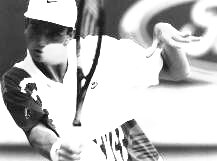

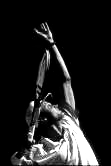
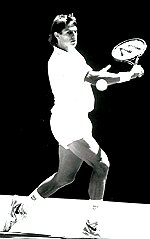

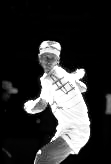





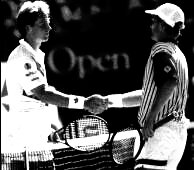
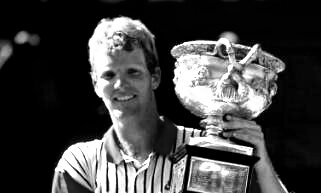
Matches on YT:
1992
French:
Forget vs. Leconte
Edberg vs. Courier
German:
Becker vs. J.McEnroe
Italian:
Edberg vs. Lendl
English:
J.McEnroe – E.Sanchez
1993
Edberg vs. Boetsch (a few points)
Bergstrom vs. Ferreira (last point)
Steven vs. Fromberg (highlights)
Edberg vs. Sampras
Courier vs. Edberg